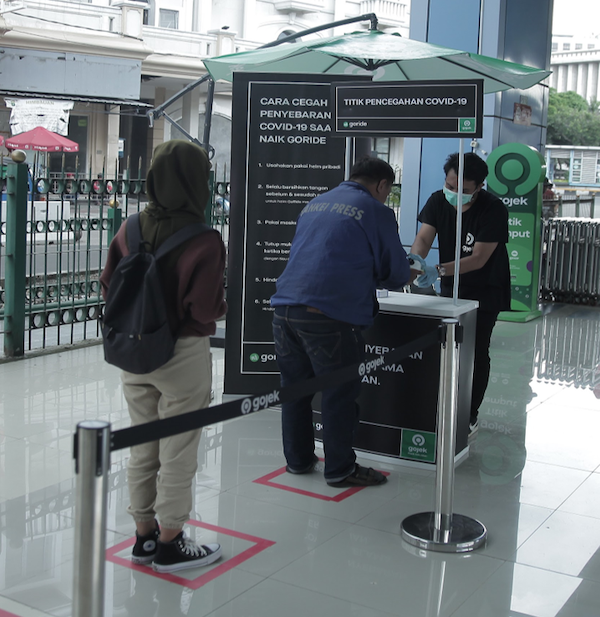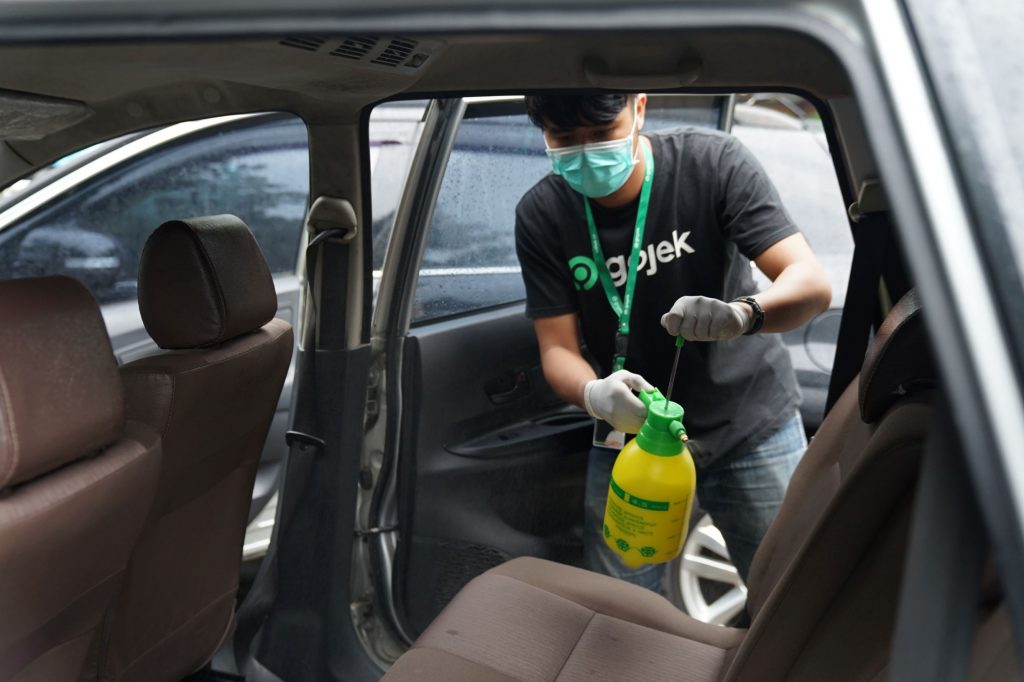After the first two cases of COVID-19 were confirmed in the country on March 2, Indonesia’s homegrown super app, Gojek, has been very active in launching new initiatives. From a contactless delivery feature, to an income support fund for partners, and multiple donations to disadvantaged communities, the company has shown that is is committed to provide assistance.
Gojek hasn’t said so far how this will affect its strategy and plans, but the firm said that it will focus on supporting drivers and merchant partners, especially since the majority of its merchants are small and medium enterprises (SMEs), and therefore vulnerable during this time of crisis.
KrASIA recently spoke with Catherine Hindra Sutjahyo, Gojek’s chief food officer, on how the company is addressing COVID-19 within its ecosystem and beyond.
KrASIA (Kr): With large-scale social restrictions in place and a ban of motorcycle passenger transport, how is Gojek adjusting its business strategy to make up for the lost orders?
Catherine Sutjahyo (CS): One thing that we have to highlight here is that we are a platform—some may call it a super app. In that sense, thankfully, our business is resilient as we don’t rely on only one particular area. So the compensation between the different services has been working quite well for us during this period.
Kr: How has the pandemic impacted GoFood and Gojek’s logistics services? How is the consumer behavior changing during the pandemic?
CS: I can’t share specific numbers, but as you can imagine, food and logistics is going strong in this period. People are going out less and ordering in more, we have seen several interesting trends around that within the food business. With families spending most of their time at home, we have seen an increase in order values, as people order larger quantities. Snacks and special food items, such as Martabak and pizza, are popular during this period.
Our focus is on being quick in responding to consumer needs. We see more people cooking at home, so we introduced an option for merchant partners to sell “ready to cook” meals, which include frozen or half-cooked meals that are easy to prepare. Essential items are a priority for consumers, as they keep their homes stocked during this time, so we have also expanded GoFood delivery to include more convenience stores and services for daily needs. Overall, we see resilience in online commerce, which includes food and package deliveries, cashless payments, and digital content (GoNews and the streaming video app GoPlay). Consumers were showing these behaviors long before the COVID-19 pandemic, and now those online services have become much more necessary.
Kr: How do you ensure the safety of goods, food, and drivers?
CS: We have lots of initiatives to ensure safety and hygiene. First, what we are pushing hard is contactless delivery and cashless payments, to limit the disease transmission risk. We provide merchants with online training related to COVID-19 prevention. We have close to 500,000 merchants and many of them are small and medium businesses, so we rely on this online training feature to educate them about this issue. We also have a health card that is attached to food orders to track who’s preparing the food, who’s delivering, and their body temperatures. We also transformed our shelters into “COVID-19 prevention points,” where drivers can come to check their body temperatures and use hand sanitizer. These are just some examples as we continue improving our efforts to protect drivers, merchants, and customers. We were starting these initiatives in Indonesia, but a few of them are already implemented in other markets as well.

Kr: SMEs are vulnerable during the pandemic and many might even go bankrupt. How is Gojek helping them during and after the crisis?
CS: Out of our 500,000 merchant partners, 96% are MSMEs, so we made it part of our mission to ensure they are supported and given opportunities to grow. For merchants who depend on offline footfalls, we are working hard to help them migrate online and increase transactions. Through services such as GoBiz, GoPay, and GoSend, we make it as seamless as possible for them to establish an online presence, process digital payments, and make deliveries. For merchants who have had to close premises or experienced a significant reduction in footfalls, we are helping them set up shop in our cloud kitchens, so they can continue with their businesses and meet online demand. We currently have 30 cloud kitchens operating across Indonesia, with plans to expand this significantly over the course of this year and next.
For online merchant partners, our focus is to help them drive demand. We have several initiatives in place for this, such as the virtual GoFood National Culinary Day, the easy setup of online promotions using GoBiz, the affordable meals program for driver-partners, and the delivery fee vouchers to attract consumers. We are also offering discount vouchers to merchant partners so they can shop for staple goods and groceries on GoFresh, and reduce operating costs.
The affordable meals program is particularly effective, because not only do drivers get access to much-needed support, it also generates demand for the micro-merchants that are participating in the scheme.
The health and safety of our partners is, of course, the biggest priority at this time. We have been conducting education on health and hygiene measures for all partners, while providing them with temperature check cards, masks, hand sanitizers, and vitamins. GoFood has also implemented contactless deliveries across markets to support social distancing efforts and ensure that merchants and drivers can meet consumer needs as safely as possible.

Kr: How effective are Gojek’s GoFood National Culinary Day, Support Local Brands ID, and other initiatives? How will they support SMEs in the long run?
CS: The GoFood National Culinary Day has been a very successful annual program for our merchants, and it’s currently in its third edition—running from April 1 to May 5. Merchants that participated in 2019 experienced a 42% increase in transaction value, compared to their regular sales period, and we have seen an increase in participating merchants this year.
The #SupportLocalBrandsID movement, in partnership with Tada and Moka, is another campaign that we are very passionate about. It is part of our larger effort to empower small businesses and help our local community with tackling this crisis. With this, we provide people access to purchase discounted coupons to use them at local brands, immediately or once the crisis is over. The coupons will be valid for a year, so consumers can continue to support local businesses that are a crucial part of our community and dependent on us for survival.
Kr: What is the biggest challenge for Gojek as a business during this crisis? Have any plans been compromised? For example, Gojek wanted to expand into Malaysia and the Philippines this year. Is that still happening?
CS: The COVID-19 crisis is affecting every single company in the world, that’s why it is called a global pandemic. I think we are well-positioned coming into this period, and we are well-funded. The biggest challenge is that we must move very fast to fulfill the needs of our customers, drivers, and merchants. For example, we launched the contactless delivery feature within three days after the first cases were found in Indonesia.
In terms of business plans, this crisis is definitely going to be one of the factors that we take into consideration. We have not decided anything yet [regarding the expansion], given that we’re only two months into this crisis. We are working very closely with governments as well as stakeholders to see how this will evolve.


